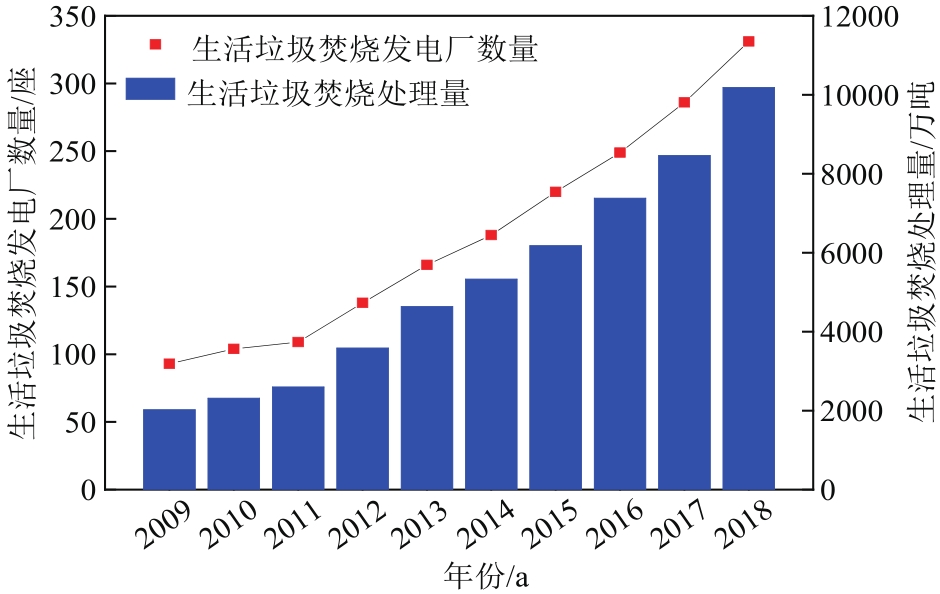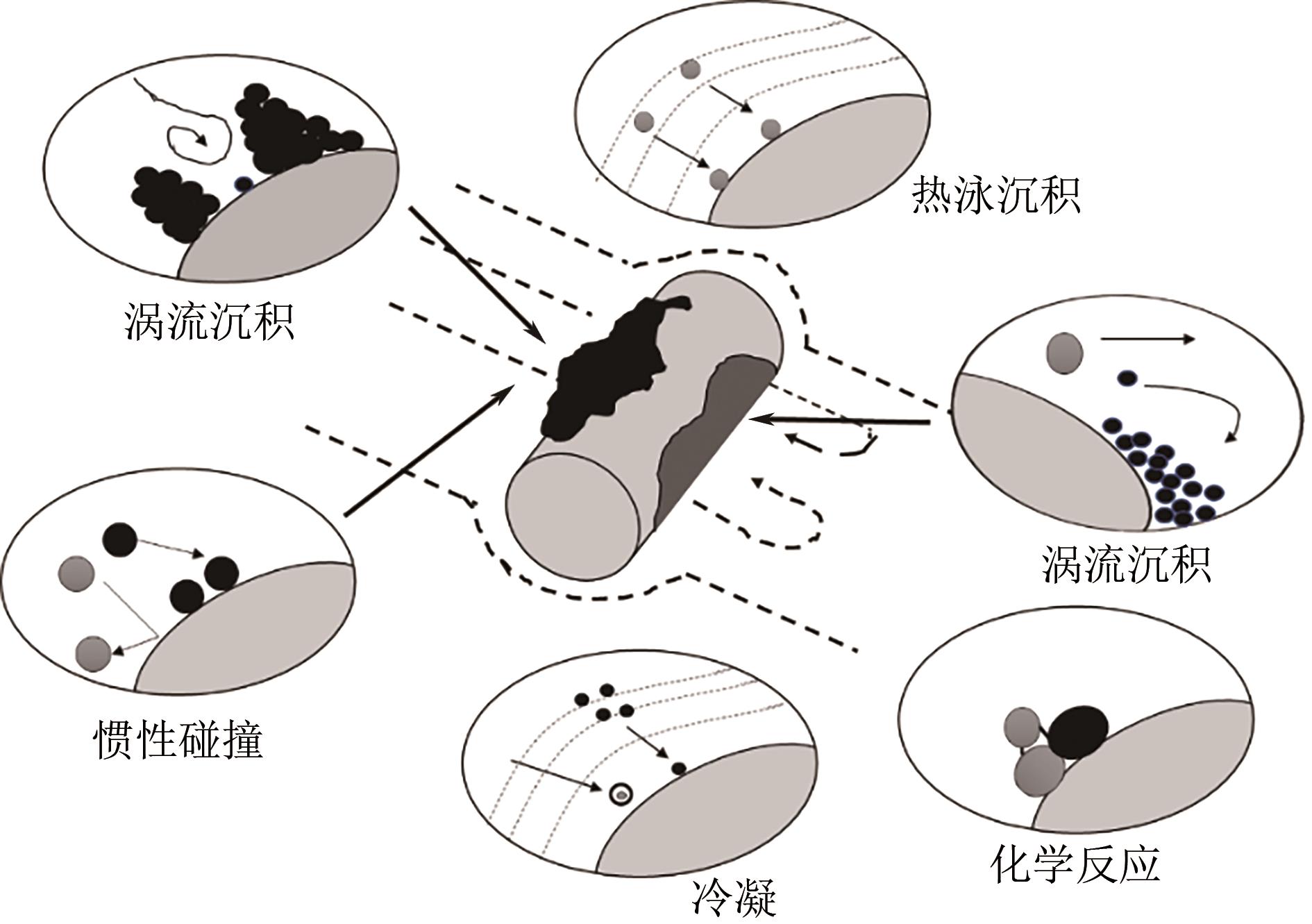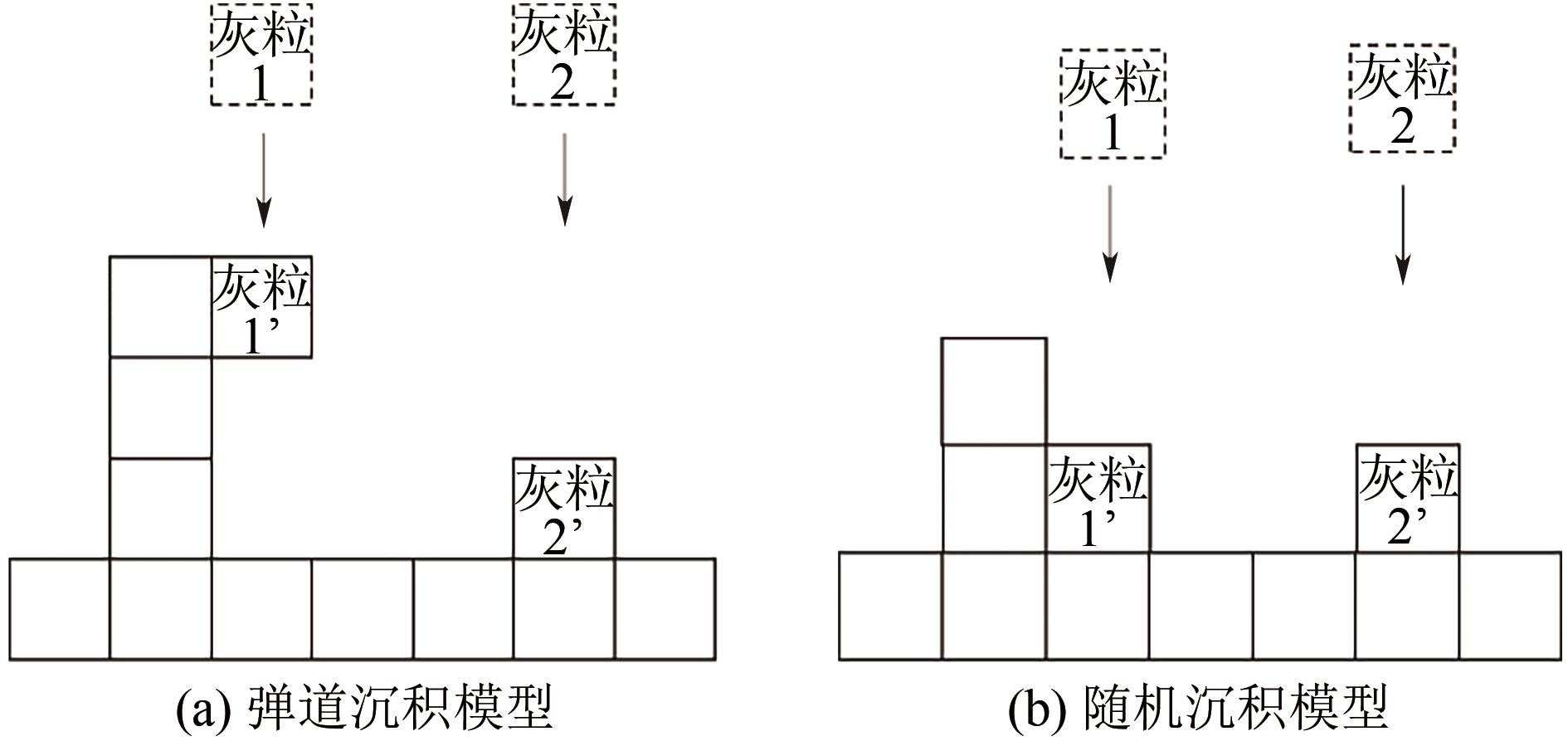化工进展 ›› 2021, Vol. 40 ›› Issue (S1): 375-385.DOI: 10.16085/j.issn.1000-6613.2020-2095
垃圾焚烧系统换热表面的积灰生长与控制研究进展
- 1.浙江大学能源清洁利用国家重点实验室,热能工程研究所,浙江 杭州 310027
2.浙江大学青山湖能源研究基地,浙江 杭州 310027
-
收稿日期:2020-10-19修回日期:2020-12-10出版日期:2021-10-25发布日期:2021-11-09 -
通讯作者:蒋旭光 -
作者简介:蒋旭光(1965—),男,博士,教授,博士生导师,研究方向为废弃物能源化和资源化。E-mail:jiangxg@zju.edu.cn 。 -
基金资助:国家重点研发计划(2018YFF0215001);国家自然科学基金创新群体(51621005);国家自然科学基金(51676172);浙江大学基本科研业务费专项资金(2018FZA4010)
Research status of deposition growth on heat exchange surface of waste incineration system and countermeasures for deposition control
JIANG Xuguang1,2( ), MENG Xiangfei1,2, LYU Guojun1,2
), MENG Xiangfei1,2, LYU Guojun1,2
- 1.State Key Laboratory of Clean Energy Utilization, Institute of Thermal Engineering, Zhejiang University, Hangzhou 310027, Zhejiang, China
2.Qingshanhu Energy Research Center, Zhejiang University, Hangzhou 310027, Zhejiang, China
-
Received:2020-10-19Revised:2020-12-10Online:2021-10-25Published:2021-11-09 -
Contact:JIANG Xuguang
摘要:
焚烧是我国处理城市生活垃圾的重要方式,能够实现城市生活垃圾的减量化、无害化和资源化利用。由于城市生活垃圾水分高、盐分多、热值低,导致垃圾焚烧炉普遍面临严重的积灰问题,这不仅为垃圾焚烧炉的安全运行带来隐患,还严重影响垃圾焚烧发电厂的经济效益。本文综述了垃圾焚烧炉受热面积灰生长的研究现状,介绍了垃圾焚烧炉受热面积灰生长的机理,分析了飞灰粒径、烟气流速、烟气温度、换热面温度等对垃圾焚烧炉受热面积灰生长特性产生影响的因素。在燃煤锅炉和生物质炉积灰结渣的现有积灰模型基础上,需要结合垃圾炉的积灰实验数据发展可以预测垃圾焚烧炉积灰结渣问题的模型。针对垃圾焚烧炉受热面积灰严重的现象,本文提出了设备改进、工艺优化、使用添加剂和涂层技术抑制积灰生长的一系列方法。最后总结了当前的重点研究内容,提出了建立能够准确预测垃圾焚烧炉积灰生长的模型,开发新的有效减轻垃圾焚烧炉换热面积灰的涂层等今后开展研究的方向,为垃圾焚烧电厂的合理运行提供了参考建议。
中图分类号:
引用本文
蒋旭光, 孟祥飞, 吕国钧. 垃圾焚烧系统换热表面的积灰生长与控制研究进展[J]. 化工进展, 2021, 40(S1): 375-385.
JIANG Xuguang, MENG Xiangfei, LYU Guojun. Research status of deposition growth on heat exchange surface of waste incineration system and countermeasures for deposition control[J]. Chemical Industry and Engineering Progress, 2021, 40(S1): 375-385.
| 炉型 | 元素质量分数/% | ||||||||||
|---|---|---|---|---|---|---|---|---|---|---|---|
| Ca | Si | Al | Mg | Fe | Na | K | Cl | C | S | P | |
| 流化床 | 15.76 | 9.95 | 6.88 | 3.71 | 4.01 | 4.03 | 1.67 | 7.81 | 7.50 | 1.22 | 1.22 |
| 炉排炉 | 39.63 | 2.95 | 0.834 | 1.43 | 0.855 | 11.21 | 5.90 | 28.17 | 4.65 | 2.10 | 0.339 |
表1 不同炉型焚烧炉飞灰元素组成[18]
| 炉型 | 元素质量分数/% | ||||||||||
|---|---|---|---|---|---|---|---|---|---|---|---|
| Ca | Si | Al | Mg | Fe | Na | K | Cl | C | S | P | |
| 流化床 | 15.76 | 9.95 | 6.88 | 3.71 | 4.01 | 4.03 | 1.67 | 7.81 | 7.50 | 1.22 | 1.22 |
| 炉排炉 | 39.63 | 2.95 | 0.834 | 1.43 | 0.855 | 11.21 | 5.90 | 28.17 | 4.65 | 2.10 | 0.339 |
| 文献 | 涂层类型 | 效果 |
|---|---|---|
| 张佳凯[ | Cr、Ni涂层 | 对煤与生物质掺烧时的积灰有明显的抑制效果 |
| Wang等[ | 复合陶瓷涂层 | 涂层对抑制积灰效果明显,有涂层的表面积灰率下降21%左右 |
| Naganuma等[ | Ni、Ti涂层 | 涂层能够有效降低积灰与换热面的粘附力,抑制积灰的产生 |
| 刘威[ | Ni涂层 | 具有抑制高碱煤飞灰在换热表面上沉积和结渣能力 |
| 王进卿等[ | 复合陶瓷涂层 | 对燃煤锅炉受热面积灰抑制作用明显 |
| 冯帅等[ | Ni涂层 | 对燃烧高碱煤的锅炉具有抑制积灰的效果 |
表2 利用涂层技术防治积灰的相关研究
| 文献 | 涂层类型 | 效果 |
|---|---|---|
| 张佳凯[ | Cr、Ni涂层 | 对煤与生物质掺烧时的积灰有明显的抑制效果 |
| Wang等[ | 复合陶瓷涂层 | 涂层对抑制积灰效果明显,有涂层的表面积灰率下降21%左右 |
| Naganuma等[ | Ni、Ti涂层 | 涂层能够有效降低积灰与换热面的粘附力,抑制积灰的产生 |
| 刘威[ | Ni涂层 | 具有抑制高碱煤飞灰在换热表面上沉积和结渣能力 |
| 王进卿等[ | 复合陶瓷涂层 | 对燃煤锅炉受热面积灰抑制作用明显 |
| 冯帅等[ | Ni涂层 | 对燃烧高碱煤的锅炉具有抑制积灰的效果 |
| 1 | 邢昱, 张兰真, 赵颖, 等. 浅谈垃圾焚烧发电技术现状及发展[J]. 资源节约与环保, 2017(4): 21, 24. |
| XING Y, ZHANG L Z, ZHAO Y, et al. The status and development of waste incineration power generation technology[J]. Resources Economization & Environment Protection, 2017(4): 21, 24. | |
| 2 | 王隽哲, 徐俊, 孙军, 等.生活垃圾焚烧炉积灰结渣问题研究[J]. 能源与环境, 2017(6): 5-7. |
| WANG J Z, XU J, SUN J, et al. Research on fouling and slagging of domestic waste incinerator[J]. Energy and Environment, 2017(6): 5-7. | |
| 3 | 蒋旭光, 龙凌, 赵晓利, 等. 固化材料在生活垃圾焚烧飞灰处置中的应用概况及前景[J]. 化工进展, 2019, 38(S1): 216-225. |
| JIANG X G, LONG L, ZHAO X L, et al. Application of solidified materials in disposal of MSWI fly ash[J]. Chemical Industry and Engineering Progress,2019, 38(S1): 216-225. | |
| 4 | 张楠. 垃圾焚烧炉换热器高温腐蚀实验研究[D]. 天津: 天津大学, 2016. |
| ZHANG N. Experimental study on high temperature corrosion of heat exchangers in waste to energy plant[D]. Tianjin: Tianjin University, 2016. | |
| 5 | 段盼巧, 张成波, 钟红春. 垃圾焚烧发电技术的应用与发展[J]. 广东化工, 2013, 40(7): 111-112. |
| DUAN P Q, ZHANG C B, ZHONG H C. The application and development of waste incineration-power generation technology[J]. Guangdong Chemical Industry2013, 40(7): 111-112. | |
| 6 | 杨征. 城市垃圾焚烧发电发展现状与展望[J]. 中国资源综合利用, 2016, 34(12): 33-35. |
| YANG Z. Current situation and prospects for municipal waste-to-energy power generation technology[J]. China Resources Comprehensive Utilization, 2016, 34(12): 33-35. | |
| 7 | 胡锦华. 垃圾焚烧系统受热面积灰生长特性研究[D]. 杭州: 浙江大学, 2020. |
| HU J H. The investigation of deposits characteristics on heating surface of waste incineration system[D]. Hangzhou: Zhejiang University, 2020. | |
| 8 | 邹嵘. 垃圾焚烧锅炉省煤器的低温腐蚀及设计简介[J]. 能源研究与管理, 2014(2): 66-68, 89. |
| ZOU R. Temperature corrosion reasons and design in waste incineration boiler[J]. Energy Research and Mangement, 2014(2): 66-68, 89. | |
| 9 | BIGNA L S, FERRAN A, STEFANIE J. Testing of the consistency of the sieving (wash-over) process of waterlogged sediments by multiple operators[J]. Journal of Archaeological Science: Reports, 2015, 2, 310-320. |
| 10 | 罗建英, 胡丹静, 邵惠萍, 等. 城市垃圾焚烧飞灰物化特性动态分析[J]. 浙江化工, 2019, 50(7): 41-46. |
| LUO J Y, HU D J, SHAO H P, et al. Dynamic analysis on the physical and chemical characteristics of municipal waste incineration fly ash[J]. Zhejiang Chemical Industry, 2019, 50(7): 41-46. | |
| 11 | 岑可法. 锅炉和热交换器的积灰、结渣、磨损和腐蚀的防止原理与计算[M]. 北京: 科学出版社, 1994: 1-5. |
| CEN K F. Principles and calculations for preventing fouling, slagging, abrasion and corrosion of boilers and heat exchangers[M]. Beijing: Science Press, 1994: 1-5. | |
| 12 | 黄宁, 汪明浩. 垃圾焚烧锅炉积灰危害及处理[J]. 科学大众(科学教育), 2015(1): 176-177. |
| HUANG N, WANG M H. Hazard and treatment of ash accumulation in garbage incineration boiler[J]. Popular Science (Science Education), 2015(1): 176-177. | |
| 13 | 钟彪. 垃圾焚烧炉结焦积灰问题及控制措施分析[J]. 科学技术创新, 2019(20): 183-184. |
| ZHONG B. Analysis on coking and fouling problems of waste incinerator and control measures[J]. Scientific and Technological Innovation, 2019(20): 183-184. | |
| 14 | ZHANG Y D, DU X L, YAN M W, et al. Heat transfer and ash deposition performance of heat exchange surface in waste incineration flue gas[J]. International Journal of Heat and Mass Transfer, 2020, 155: 119691. |
| 15 | 马云峰, 白力, 李晓东, 等. 典型生活垃圾炉排焚烧锅炉沿程受热面飞灰理化特性分析[J]. 环境卫生工程, 2020, 28(3): 1-7. |
| MA Y F, BAI L, LI X D, et al. Analysis on physicochemical characteristics of fly ash along the heating surfaces of typical MSW grate incineration boiler[J]. Environmental Sanitation Engineering, 2020, 28(3): 1-7. | |
| 16 | 陈清, 汪屈峰, 李艳, 等. 华南某垃圾焚烧厂焚烧飞灰理化特性及重金属形态研究[J]. 环境卫生工程, 2019, 27(4): 13-18. |
| CHEN Q, WANG Q F, LI Y, et al. Research on physico-chemical characteristics and heavy metal fraction in fly ash from a MSW incineration plant in South China [J]. Environmental Sanitation Engineering, 2019, 27(4): 13-18. | |
| 17 | 唐智, 陈晓平, 刘道银, 等. 流化床垃圾焚烧炉飞灰沉积实验[J]. 化工进展, 2020, 39(1): 387-394. |
| TANG Z, CHEN X P, LIU D Y, et al. Experimental investigation of ash deposition on heating surfaces in a municipal solid waste (MSW) bubbling fluidized beds[J]. Chemical Industry and Engineering Progress, 2020, 39(1): 387-394. | |
| 18 | 常威. 生活垃圾焚烧飞灰的水洗及资源化研究[D]. 杭州: 浙江大学,2016. |
| CHANG W. Study on the washing process and recycling of MSWI fly ash[D]. Hangzhou: Zhejiang University, 2016. | |
| 19 | ZHANG S, CHEN Z L, LIN X Q, et al. Kinetics and fusion characteristics of municipal solid waste incineration fly ash during thermal treatment[J]. Fuel, 2020, 279: 118410. |
| 20 | 姜玲玲, 党文达, 钟红春, 等. 生活垃圾焚烧厂飞灰无害化处理技术的应用[J]. 环境卫生工程, 2013, 21(5): 45-46, 48. |
| JIANG L L, DANG W D, ZHONG H C, et al. Application of fly ash hazard-free treatment technology in domestic waste incineration plant[J]. Environmental Sanitation Engineering, 2013, 21(5): 45-46, 48. | |
| 21 | LI J B, ZHU M M, ZHANG Z Z, et al. Characterisation of ash deposits on a probe at different temperatures during combustion of a Zhundong lignite in a drop tube furnace[J]. Fuel Processing Technology, 2016, 144: 155-163. |
| 22 | 陈自勇, 程旻, 廖强, 等. 燃煤锅炉烟气侧换热表面的积灰机制及影响因素[J]. 中国电机工程学报, 2019, 39(5): 1349-1366. |
| CHEN Z Y, CHENG M, LIAO Q, et al. A review on ash deposition on heat exchanger surface in coal-fired boilers: mechanisms and influence factors[J]. Proceedings of the CSEE, 2019, 39(5): 1349-1366. | |
| 23 | MA W C, WENGA T, FRANDSEN F J, et al. The fate of chlorine during MSW incineration: vaporization, transformation, deposition, corrosion and remedies[J]. Progress in Energy and Combustion Science, 2020, 76: 100789. |
| 24 | LI G D, LI S Q, HUANG Q, et al. Fine particulate formation and ash deposition during pulverized coal combustion of high-sodium lignite in a down-fired furnace[J]. Fuel, 2015, 143: 430-437. |
| 25 | 唐智, 陈晓平, 刘道银, 等. 垃圾焚烧炉对流受热面烧结积灰生长特性[J]. 化工进展, 2020, 39(2): 767-775. |
| TANG Z, CHEN X P, LIU D Y, et al. Characterization of ash deposits from convective heating surfaces in a CFB municipal solid waste incinerator[J]. Chemical Industry and Engineering Progress, 2020, 39(2): 767-775. | |
| 26 | 许明磊, 严建华, 马增益, 等. 垃圾焚烧炉受热面的积灰腐蚀机理分析[J]. 中国电机工程学报, 2007, 27(23): 32-37. |
| XU M L, YAN J H, MA Z Y, et al. Mechanism analysis of ash deposits corrosion in waste incinerator [J]. Proceedings of the CSEE, 2007, 27(23): 32-37. | |
| 27 | 袁野, 郑妍, 马凤明, 等. 循环流化床垃圾炉积灰结焦机理及控制方法[J]. 洁净煤技术, 2019, 25(6): 177-183. |
| YUAN Y, ZHENG Y, MA F M, et al. Mechanism and control method of fouling and slagging in circulating fluidized bed garbage incinerator[J]. Clean Coal Technology, 2019, 25(6): 177-183. | |
| 28 | 俞海淼, 王桂英, 陈德珍, 等. 炉排式垃圾焚烧炉的结渣特性研究[J]. 热能动力工程, 2009, 24(3): 400-404, 414. |
| YU H M, WANG G Y, CHEN D Z, et al. A study of the slagging characteristics of a grate type solid waste incinerator[J]. Journal of Engineering for Thermal Energy and Power, 2009, 24(3): 400-404, 414. | |
| 29 | YANG Z, CHEN X P, LIU D Y, et al. Experimental investigation of ash deposits on convection heating surfaces of a circulating fluidized bed municipal solid waste incinerator[J]. Journal of Environmental Sciences, 2016, 48(10): 169-178. |
| 30 | WANG Y G, CHEN H, CHEN Z Y, et al. Slagging and fouling characteristics of HRSG for ferrosilicon electric furnaces[J]. Energies, 2015, 8(2): 1101-1113. |
| 31 | WEBER R, SCHAFFEL-MANCINI N, MANCINI M, et al. Fly ash deposition modelling: requirements for accurate predictions of particle impaction on tubes using RANS-based computational fluid dynamics[J]. Fuel, 2013, 108: 586-596. |
| 32 | HAN Z M, XU Z M, YU X Y, et al. Numerical simulation of ash particles deposition in rectangular heat exchange channel[J]. International Journal of Heat and Mass Transfer, 2019, 136: 767-776. |
| 33 | HAN H, HE Y L, TAO W Q, et al. A parameter study of tube bundle heat exchangers for fouling rate reduction[J]. International Journal of Heat and Mass Transfer, 2014, 72: 210-221. |
| 34 | MU L, QIU Q G, YIN H C, et al. Numerical investigation of ash particles deposition and distribution in a refining and chemical wastewater incineration equipment[J]. Nature Environment and Pollution Technology, 2016, 15(1): 1-10. |
| 35 | ABD-ELHADY M S, RINDT C C M, WIJERS J G, et al. Removal of particles from powdery fouled surfaces[C]//Proceedings of the 12th International Heat Transfer Conference. Grenoble, France: Elsevier, 2002. |
| 36 | LIU G Q,LI S Q,YAO Q. A JKR-based dynamic model for the impact of micro-particle with a flat surface[J]. Powder Technolog, 2011, 207(1/2/3): 215-223. |
| 37 | WANG F L, HE Y L, TONG Z X, et al. Real-time fouling characteristics of a typical heat exchanger used in the waste heat recovery systems[J]. International Journal of Heat and Mass Transfer, 2017, 104: 774-786. |
| 38 | LAXMINARAYAN Y, JENSEN P A, WU H, et al. Biomass fly ash deposition in an entrained flow reactor[J]. Proceedings of the Combustion Institute, 2019, 37(3): 2689-2696. |
| 39 | CAI Y T, YANG W M, ZHENG Z M, et al. Modelling of ash deposition in biomass boilers: a review[J]. Energy Procedia, 2017, 143: 623-628. |
| 40 | CAI Y T, TAY K L, ZHENG Z M, et al. Modeling of ash formation and deposition processes in coal and biomass fired boilers: a comprehensive review[J]. Applied Energy, 2018, 230: 1447-1544. |
| 41 | LITCHFORD R J, JENG S M. Statistical modeling of turbulent dilute combusting sprays[J]. AIAA Journal, 1992, 30(10): 2549-2552. |
| 42 | BUTLER B W, DENISON M K, WEBB B W. Radiation heat transfer in a laboratory-scale, pulverized coal-fired reactor: experiment and analysis[J]. Experimental Thermal and Fluid Science, 1994, 9, (1): 69-79. |
| 43 | MENDES N, LOURIVAL J, BAZZO E, et al. Characterization and growth modeling of ash deposits in coal fired boilers[J]. Powder Technology, 2012, 217: 61-68. |
| 44 | 吴永新. 生活垃圾机械炉排焚烧炉结焦积灰的问题分析及控制对策研究[D]. 北京: 清华大学, 2013. |
| WU Y X. Analysis and control measures for MSW grate incinerator coking and ash deposition[D]. Beijing: Tsinghua University, 2013. | |
| 45 | SHI Y T, GAO M, TANG G H, et al. Experimental research of CFB ash deposition on helical finned tubes[J]. Applied Thermal Engineering, 2012, 37: 420-429. |
| 46 | WALMSLEY T G, WALMSLEY M R W, ATKINS M J, et al. Numerical performance comparison of different tube cross-sections for heat recovery from particle-laden exhaust gas streams[J]. Procedia Engineering, 2012, 42: 1351-1364. |
| 47 | WANG N H, GUO J F, GU M Z, et al. Simulation of particle deposition on the tube in ash-laden flow using the lattice Boltzmann method[J]. International Communications in Heat and Mass Transfer, 2016, 79: 31-38. |
| 48 | BOURIS D, KONSTANTINIDIS E, BALABANI S, et al. Design of a novel, intensified heat exchanger for reduced fouling rates[J]. International Journal of Heat and Mass Transfer, 2005, 48(18): 3817-3832. |
| 49 | 张佳凯. 煤与生物质积灰结渣防沾污特性研究与低温硫酸氢铵积灰特性及其消除机理研究[D]. 杭州: 浙江大学, 2020. |
| ZHANG J K. Experimental study on the reduction mechanism of ash deposition during co-combustion of coal and biomass and ammonium bisulfate fouling[D]. Hangzhou: Zhejiang University, 2020. | |
| 50 | VAMVUKA D, ZOGRAFOS D. Predicting the behaviour of ash from agricultural wastes during combustion[J]. Fuel, 2004, 83(14/15): 2051-2057. |
| 51 | DAYTON D C, JENKIN B M, TURN S Q, et al. Release of inorganic constituents from leached biomass during thermal conversion[J]. Energy and Fuels, 1999, 13, (4): 860-870. |
| 52 | XIONG S J, BURVALL J, ÖRBERG H, et al. Slagging characteristics during combustion of corn stovers with and without Kaolin and calcite[J]. Energy Fuels, 2016, 22(5): 3465-3470. |
| 53 | WANG L, SKJEVRAK G, HUSTAD J E, et al. Effects of additives on barley straw and husk ashes sintering characteristics[J]. Energy Procedia, 2012, 20: 30-39. |
| 54 | WANG J J, YUAN Y C, CHI Z H, et al. Development and application of anti-fouling ceramic coating for high-sodium coal-fired boilers[J]. Journal of the Energy Institute, 2017, 91(6): 962-969. |
| 55 | NAGANUMA H, IKEDA N, ITO T, et al. Control of ash deposition in solid fuel fired boiler[J]. Fuel Processing Technology,2013, 105: 77-81. |
| 56 | NAGANUMA H, IKEDA N, ITO T, et al. Reduction mechanisms of ash deposition in coal and/or biomass combustion boilers[J]. Fuel, 2013, 106: 303-309. |
| 57 | 刘威. 高碱煤燃烧特性实验研究[D]. 上海: 上海交通大学, 2014. |
| LIU W. Experimental study of high-alkali coal on combustion characteristic[D]. Shanghai: Shanghai Jiao Tong University, 2014. | |
| 58 | 王进卿, 袁益超, 黄国强, 等. 燃煤锅炉防结渣复合陶瓷涂层技术应用[J]. 热力发电, 2017, 46(6): 75-79, 87. |
| WANG J Q, YUAN Y C, HUANG G Q, et al. Application of anti-slagging composite ceramic coating in coal-fired boilers[J]. Thermal Power Generation, 2017, 46(6): 75-79, 87. | |
| 59 | 冯帅, 张忠孝, 乌晓江, 等. 高碱煤灰渣在涂镍钢表面的粘附特性研究[J]. 锅炉技术, 2015, 46(2): 6-10. |
| FENG S, ZHANG Z X, WU X J, et al. The adhesion properties of high alkali ash on the surface of nickel plated steel[J]. Boiler Technology, 2015, 46(2): 6-10. |
| [1] | 徐晨阳, 都健, 张磊. 基于图神经网络的化学反应优劣评价[J]. 化工进展, 2023, 42(S1): 205-212. |
| [2] | 陈林, 徐培渊, 张晓慧, 陈杰, 徐振军, 陈嘉祥, 密晓光, 冯永昌, 梅德清. 液化天然气绕管式换热器壳侧混合工质流动及传热特性[J]. 化工进展, 2023, 42(9): 4496-4503. |
| [3] | 张帆, 陶少辉, 陈玉石, 项曙光. 基于改进恒热传输模型的精馏模拟初始化[J]. 化工进展, 2023, 42(9): 4550-4558. |
| [4] | 张振, 李丹, 陈辰, 吴菁岚, 应汉杰, 乔浩. 吸附树脂对唾液酸的分离纯化[J]. 化工进展, 2023, 42(8): 4153-4158. |
| [5] | 张智琛, 朱云峰, 成卫戍, 马守涛, 姜杰, 孙冰, 周子辰, 徐伟. 高压聚乙烯失控分解研究进展:反应机理、引发体系与模型[J]. 化工进展, 2023, 42(8): 3979-3989. |
| [6] | 陈森, 殷鹏远, 杨证禄, 莫一鸣, 崔希利, 锁显, 邢华斌. 功能固体材料智能合成研究进展[J]. 化工进展, 2023, 42(7): 3340-3348. |
| [7] | 王硕, 张亚新, 朱博韬. 基于灰色预测模型的水煤浆输送管道冲蚀磨损寿命预测[J]. 化工进展, 2023, 42(7): 3431-3442. |
| [8] | 赵毅, 杨臻, 张新为, 王刚, 杨旋. 不同裂缝损伤和愈合温度条件下沥青自愈合行为的分子模拟[J]. 化工进展, 2023, 42(6): 3147-3156. |
| [9] | 陆诗建, 张媛媛, 吴文华, 杨菲, 刘玲, 康国俊, 李清方, 陈宏福, 王宁, 王风, 张娟娟. 百万吨级CO2捕集项目亚硝胺污染物扩散健康风险评估[J]. 化工进展, 2023, 42(6): 3209-3216. |
| [10] | 周磊, 孙晓岩, 陶少辉, 陈玉石, 项曙光. 基于分离因数法的简捷炼油塔模型开发及应用[J]. 化工进展, 2023, 42(6): 2819-2827. |
| [11] | 李卫华, 吴寅凯, 孙英杰, 尹俊权, 辛明学, 赵友杰. 垃圾焚烧飞灰重金属毒性浸出评价方法研究进展[J]. 化工进展, 2023, 42(5): 2666-2677. |
| [12] | 赵景斌, 王彦富, 王涛, 马伟恺, 王琛. 基于蒙特卡洛模拟和动态事件树的储罐脆弱性评估[J]. 化工进展, 2023, 42(5): 2751-2759. |
| [13] | 李芸, 崔楠, 熊星星, 黄志远, 王东亮, 许丹, 李军, 李泽兵. 稀土Er(Ⅲ)对短程硝化性能的影响及其抑制动力学特性[J]. 化工进展, 2023, 42(3): 1659-1668. |
| [14] | 张建伟, 许蕊, 张忠闯, 董鑫, 冯颖. 基于卷积神经网络的撞击流反应器浓度场混合特性[J]. 化工进展, 2023, 42(2): 658-668. |
| [15] | 曹敏, 毛玉娇, 王倩倩, 李莎, 闫晓亮. 金属催化剂烧结机制及抗烧结策略[J]. 化工进展, 2023, 42(2): 744-755. |
| 阅读次数 | ||||||
|
全文 |
|
|||||
|
摘要 |
|
|||||




